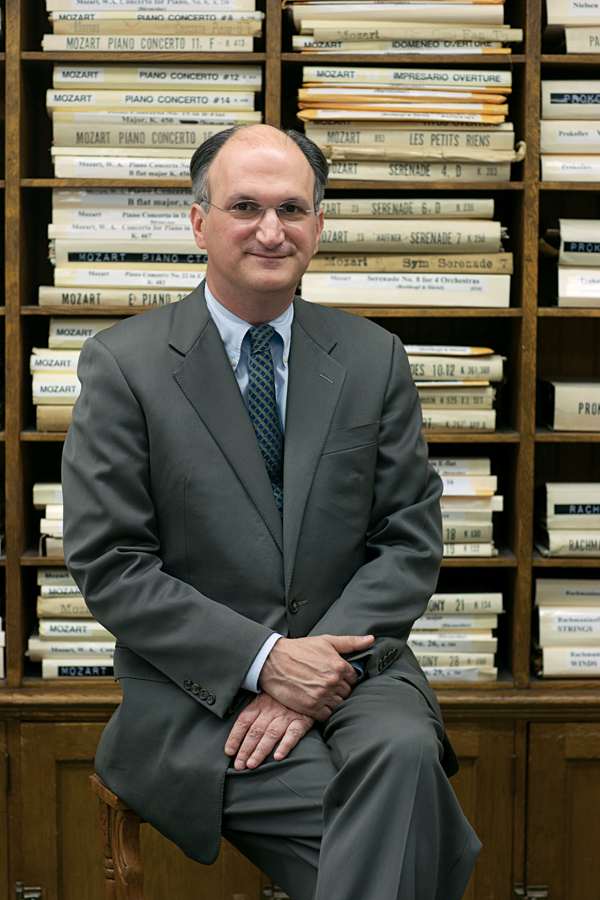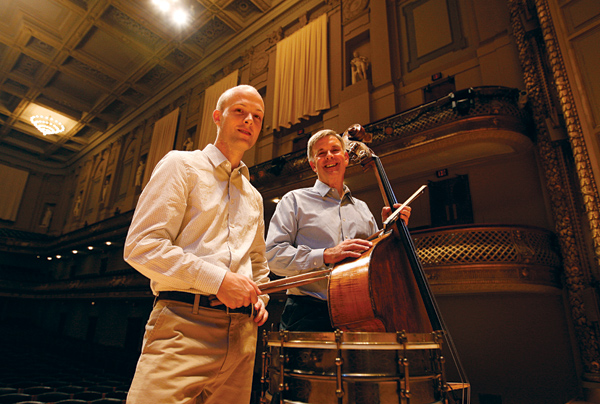Mike Tetreault’s BSO Audition

“I want someone to be so brilliant that there’s no question.” — Mark Volpe, BSO managing director (Photo by Michael J. Lutch)
Mike Tetreault attended the Eastman School of Music from 1996 to 2001, and for two of those years he shared an 80-square-foot practice room with Lee Vinson. The two friends spruced up their space with a mini fridge and a lounge chair, and in their spare time they hung out with the same crowd. They were also unusually serious about their careers. In 2007, two years after graduating from Eastman, Vinson won a percussion job with the BSO. Though reserved by nature, he couldn’t help feeling as though a dream had come true.
Vinson moved into a $1,900-per-month, two-bedroom South End brownstone, a fourth-floor walkup with hardwood floors and a view of Boston’s skyline. He lived with his girlfriend, Tamsin Johnston, an oboist. He loved the history in Boston. He loved walking past the row homes, so different from his native Alabama. He was 28, and he had the best job in the world.
But almost immediately there were problems. “In the beginning, I was a deer in the headlights,” Vinson says. He was stung by some of the criticism directed at his playing. He tried to block it from his mind, but found it difficult. “Then the performance anxiety comes back because these people aren’t telling me what they think,” he says. “They just want to glare at you. I mean, really, you just want to turn around and scowl at me and that’s supposed to help fix this whole thing?”
At the end of Vinson’s first year with the BSO, he fell one vote shy of earning tenure, so he was put on another year of probation. He started asking his colleagues how? to “fix” his playing, but one person would tell him to try one thing and another would suggest he try something else entirely. “You’d add it up and it didn’t make sense,” he says. BSO timpanist Timothy Genis says, “During this time we’re talking with him, no one really knew what to tell him. Instinctually, it just wasn’t quite there. It wasn’t ever like, ‘That sounded incredible. That was perfect.’ Which you should be able to say about your colleague at least once in his career.”
At the end of his second year, the audition committee met again, but by then, two of the members who’d supported Vinson’s hiring in the first place had retired. He again wound up one vote short, and was again put on probation. “There was something so finite that wasn’t quite right about what he was doing,” Genis says. “His timing wasn’t quite right on this one. His balance wasn’t quite right on this one. It confused a lot of people.”
At the end of his third year, in 2010, there was another meeting, this time at Tanglewood during the summer. Vinson’s friend Dan Bauch, another percussionist, was granted tenure that day, and everyone was offering congratulations. Then Vinson was brought in, and a few members of the percussion section and the personnel manager were waiting for him. Vinson remembers someone saying they would help him during “this transition period.” He hadn’t made the cut.
Mike Tetreault was one of 294 percussionists who sent a résumé to the BSO in the fall of 2011 for the two openings. Rumors circulated that the applicant pool included a number of heavy hitters, including two candidates from Big Five orchestras, former players from Chicago and Cleveland.
That October, the BSO contacted Tetreault with instructions for preparing for his live audition in January 2012. But first, he’d have to make the preliminary cut. He was given a month to submit a videotaped recording of 14 musical excerpts, all of which had to be recorded without a break, and without him leaving the frame of the camera during the take. He could make no mistakes during the 10-minute-long segment. If the BSO was suitably impressed with his offering, he’d be allowed to formally audition in person.
For about a week around Thanksgiving, Tetreault rehearsed eight hours a day with the Colorado Symphony, then drove 30 miles to practice at the university in Boulder. He would use the university’s recital hall from 6 p.m. to 3 a.m. to work on the excerpts. After a week of recording, he was at last satisfied with his audition tape, and sent it off to Boston.
On December 3 he got the e-mail he was hoping for: Of the 74 people who’d sent in tapes, 35 had been invited to audition, and he was one of them. In a little more than a month, he’d be auditioning live in Symphony Hall.
As he neared his visit to Boston, Tetreault scheduled a “hard day” to simulate the audition. He didn’t eat at all. He moved heavy things around in order to wear out his shoulders, back, and hands. Then he played through all of his music without warming up.
It was in the last week of August 2010 that Lee Vinson, unsuccessful in three tries at tenure, lost his job with the BSO. Unfortunately for him, he’d just signed a yearlong lease that started on September 1. The symphony offers a final year of performing to players who don’t make tenure, so Vinson, unsure of? how to make the rent otherwise, took it.
When his final season ended on August 31, 2011, Vinson packed up everything in his brownstone and moved to Alexandria, Virginia, where he now lives in a modest two-bedroom apartment. The second bedroom is full of instruments, including two snare drums, a xylophone, a glockenspiel, and a marimba. He has neighbors above and below him, but thankfully, they don’t mind his constant practicing.

Happier Days: From left, Lee Vinson with BSO double bass player Lawrence Wolfe in 2007.
It’s March when I visit Vinson at his apartment, and the place is impossibly clean. Sliding doors lead to a concrete patio that shows no signs of use. For a musician, his home is strangely quiet. There’s no background music, and he doesn’t play a single note during my time with him. When there’s a break in the conversation, we listen to foot-steps and the children playing on the sidewalk outside.
He tells me that he hates the small chandelier that hangs over the dining room table because it blocks the view of his antique drum collection, then he begins to pace all around me. There’s an edge of panic and uncertainty to his voice, but for the most part he’s remaining calm. It’s when we start to talk about the audition committee that he quickly loses his composure and heads to the bathroom. I hear him crying. The idea that he was betrayed, that his dream was taken away from him, still affects him profoundly. He comes back, visibly shaken. “I’m not going back up there,” he says when he recovers. Then, in the next beat, he says, “I miss Boston dearly. I worked harder than anybody there….”
The time he spent with the BSO after being told he’d lost his job with the orchestra was “the worst year ever,” he continues. “I was like a fetus on the couch. Balled up bawling for weeks on end.”
He’s had six auditions since then, but during all of them, his focus has slipped and the negative voices have crept in. He’ll look down at his five-octave Yamaha marimba and not even see it. When he’s given three minutes of Bach to play at an audition, he pays attention not to the simple, beautiful chord changes, nor to the way the dark rosewood resonates so earthily on the low notes, but to the voices in his head: What if I mess up? What are they thinking? What am I thinking? Is this what they want to hear? Is this going well? What if I missed a note? Oh God, I’m lost. It just fell apart. I’m done.
He’s aware of what’s happening. He knows his nerves are affecting his playing. But once the doubt sets in, it messes with the most fundamental part of his job: his timing. Like a baseball player who can no longer throw accurately, Vinson’s the victim of “yips” that attack his basic execution. With each audition he worries that he’s out to prove something, to prove that even though he was fired from the BSO, he’s better than everyone else. “That’s some dangerous stuff. I try not to admit that some of that exists, but I think it does.” Dangerous? “I don’t have any hair left. I feel like I’m 40,” he explains. “It takes that level of pouring your life into it for what feels like a lottery sometimes.”
Anonymous behind a screen, Mike Tetreault readies himself to begin his Symphony Hall audition. But just before he starts playing, he’s overcome with a sense that something’s not right. He doesn’t like being alone on the stage, behind a screen, without being able to see anyone else. He can hear people shifting impatiently in their seats. As a seasoned auditioner, he’s always found this moment to be the most unnerving. It’s not how he experiences music. It should be collaborative.
It’s time to begin, so he tries to shake these thoughts from his mind, focusing instead on the music he’s come so far to play. He makes the Delécluse snare-drum etudes as inclusive and expansive as they can be. He goes for crisp and clear with the light snare-drum excerpt of Prokofiev. Each piece, he knows, gives him an opportunity to project a feeling, to tell the jury who he is. But then comes the marimba solo by Akira Miyoshi. Suddenly a thought enters his mind: I really don’t want to screw this up.
And at that very moment, he does. “It wasn’t terrible,” he says later. “I missed probably five notes. But my impression was that at that point my audition was over.”
In the end, he doesn’t advance past the first round. His number isn’t called.
Tetreault is haunted by the idea that he’s never really gotten to do the thing he’s spent so much of his life working for. He gets glimpses of it, moments playing in Colorado when the music clicks and feels solid. And that pushes him forward. But he admits that he may be borderline delusional to keep trying. The quest for success sometimes seems to have overtaken him. It feels that way when he’s talking with someone but isn’t really listening because he’s fixated on the future; when his fingers are always tapping out rhythms on the table, always practicing; when he stops talking mid-sentence to sing what he means, his voice articulating little drumming passages to explain things when words fail. Mostly, though, he’s consumed by a single thought these days: Give me success or take this desire away from me. One of the two.